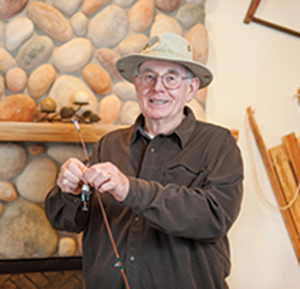Knee pain and problems with function are common as we age. In the past 10 years, the number of older Americans having had knee replacement surgery has more than doubled.
 Dick Paveletzke, Boulder Junction
Dick Paveletzke, Boulder Junction
Dick Paveletzke, 68, Boulder Junction, knew both his knees needed to be replaced. Concern about undergoing the surgery while managing a chronic condition slowed his decision."I had trouble with knee pain for years," Paveletzke said. "We've enjoyed going to places such as Disney. I always had a lot of trouble walking and a lot of pain. You think it's going to get better or go away, but it doesn't."
Paveletzke is retired after working 30 years for a Fox Valley utility overseeing purchasing and receiving duties. He is no stranger to joint surgery, having had a full shoulder replacement 17 years ago.
"My shoulder locked up, and I knew I needed the surgery," he said. "The same thing happened with my knees. One locked up. An X-ray showed the cartilage was almost completely gone and the other one was wearing way."
His doctor suggested both knees be replaced about eight weeks apart.
"The arthritis in Dick's knees was to the extent that surgery was the only viable option," said Orthopedic Surgeon
John Kozisek, M.D., Marshfield Clinic Minocqua Center. "He needed a full replacement for each knee. Which one we did first really didn't matter. Staging the procedures eight weeks apart allowed for the first knee to heal enough to become the good knee after surgery was done on the other one."
Although the X-ray signaled both knees needed replacement, Paveletzke hesitated. He had been diagnosed with atrial fibrillation and coronary artery disease three years earlier and was taking Coumadin, a medication to help prevent blood clots that could lead to a stroke. Undergoing knee surgery would require going off the medication for a few days.
"I was afraid of having a stroke if I wasn't on the Coumadin," Paveletzke said. "This fear kept me from fixing my knees sooner."
Dr. Kozisek was able to address his concern. He used an injectable anti-clotting medication during the time the Coumadin was suspended. "This approach is well-suited for elective surgeries, such as a knee replacement," Dr. Kosizek said.
"My questions were answered," Paveletzke said. "I was amazed at how well everything went from the time the first procedure began until the other knee was done. My advice is not to wait. If you need to have something like this done, get the information you need and get it done."
Having new knees has motivated Paveletzke to achieve new health goals. "I've been watching my carbs and exercising more," he said. "My granddaughter wants her grandmother and me to return to Disney. This time I will be able to walk the park without hurting."
